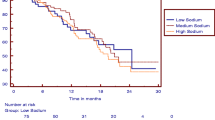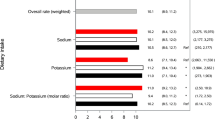Abstract
Purpose
Sodium restriction is important for the management of chronic kidney disease (CKD). The present study evaluated the factors impacting dietary sodium restriction in a cohort of Chinese patients with CKD.
Methods
A questionnaire on dietary sodium restriction was administered to patients with non-dialysis CKD who visited our CKD clinic from September 2014 to March 2015. Twenty-four-hour urinary sodium excretion (24-h UNa) was measured. Logistic regression was performed to examine the association between patient characteristics and sodium restriction.
Results
Two hundred and twenty-nine patients were included in the final analysis. Most of the patients (97.7 %) declared their awareness of the necessity of sodium restriction, but 27.3 % of them chose an incorrect sodium restriction limit. Most of the patients (85.2 %) also reported that they had taken actions to reduce their sodium consumption, with intolerance of sodium restriction as the most common reason for taking no actions. Only 42 patients (18.3 %) had a 24-h UNa of <100 mmol. Multivariable logistic regression showed that age and the use of condiments were independently associated with successful sodium restriction [odds ratio (95 % confidence interval) 1.04 (1.01–1.07), p = 0.006 and 0.38 (0.16–0.88), p = 0.023, respectively]. Most of the patients (83.0 %) did not know how to estimate their sodium intake from condiments.
Conclusions
This study indicates that there is much room for improvement in dietary sodium restriction in Chinese patients with CKD. Condiments as a hidden source of sodium intake should be stressed in the education of these patients.
Similar content being viewed by others
References
Vegter S, Perna A, Postma MJ, Navis G, Remuzzi G, Ruggenenti P (2012) Sodium intake, ACE inhibition, and progression to ESRD. J Am Soc Nephrol 23(1):165–173
McMahon EJ, Bauer JD, Hawley CM et al (2013) A randomized trial of dietary sodium restriction in CKD. J Am Soc Nephrol 24(12):2096–2103
D’Elia L, Rossi G, Schiano di Cola M, Savino I, Galletti F, Strazzullo P (2015) Meta-analysis of the effect of dietary sodium restriction with or without concomitant renin–angiotensin–aldosterone system-inhibiting treatment on albuminuria. Clin J Am Soc Nephrol 10(9):1542–1552
Agarwal R (2012) Resistant hypertension and the neglected antihypertensive: sodium restriction. Nephrol Dial Transplant 27(11):4041–4045
Sinnakirouchenan R, Kotchen TA (2014) Role of sodium restriction and diuretic therapy for “resistant” hypertension in chronic kidney disease. Semin Nephrol 34(5):514–519
McMahon EJ, Campbell KL, Bauer JD, Mudge DW (2015) Altered dietary salt intake for people with chronic kidney disease. Cochrane Database Syst Rev 2:CD010070
Humalda JK, Navis G (2014) Dietary sodium restriction: a neglected therapeutic opportunity in chronic kidney disease. Curr Opin Nephrol Hypertens 23(6):533–540
Campbell KL, Johnson DW, Bauer JD et al (2014) A randomized trial of sodium-restriction on kidney function, fluid volume and adipokines in CKD patients. BMC Nephrol 15:57
de Brito-Ashurst I, Perry L, Sanders TA et al (2013) The role of salt intake and salt sensitivity in the management of hypertension in South Asian people with chronic kidney disease: a randomised controlled trial. Heart 99(17):1256–1260
Weir MR, Townsend RR, Fink JC et al (2012) Urinary sodium is a potent correlate of proteinuria: lessons from the chronic renal insufficiency cohort study. Am J Nephrol 36(5):397–404
Inker LA, Astor BC, Fox CH et al (2014) KDOQI US commentary on the 2012 KDIGO clinical practice guideline for the evaluation and management of CKD. Am J Kidney Dis 63(5):713–735
(2000) K/DOQI clinical practice guidelines for nutrition in chronic renal failure. Am J Kidney Dis 35(6 Suppl 2):S1–S140
Kutlugün AA, Arıcı M, Yıldırım T et al (2011) Daily sodium intake in chronic kidney disease patients during nephrology clinic follow-up: an observational study with 24-hour urine sodium measurement. Nephron Clin Pract 118(4):c361–c366
Wright JA, Cavanaugh KL (2010) Dietary sodium in chronic kidney disease: a comprehensive approach. Semin Dial 23(4):415–421
Vennegoor MA (2009) Salt restriction and practical aspects to improve compliance. J Ren Nutr 19(1):63–68
Zhang R, Wang Z, Fei Y et al (2015) The difference in nutrient intakes between Chinese and Mediterranean, Japanese and American diets. Nutrients 7(6):4661–4688
Du S, Neiman A, Batis C et al (2014) Understanding the patterns and trends of sodium intake, potassium intake, and sodium to potassium ratio and their effect on hypertension in China. Am J Clin Nutr 99:334–343
de Brito-Ashurst I, Perry L, Sanders TA, Thomas JE, Yaqoob MM, Dobbie H (2011) Barriers and facilitators of dietary sodium restriction amongst Bangladeshi chronic kidney disease patients. J Hum Nutr Diet 24(1):86–95
Wang Y, Sun L, Wang H et al (2012) Importance and benefits of dietary sodium restriction in the management of chronic kidney disease patients: experience from a single Chinese center. Int Urol Nephrol 44(2):549–556
World Health Organization (2011) Strategies to monitor and evaluate population sodium consumption and sources of sodium in the diet: report of a joint technical meeting convened by WHO and the Government of Canada. World Health Organization, Geneva
(2013) The 2012 kidney disease: improving global outcomes (KDIGO) clinical practice guideline for evaluation and management of CKD. Kidney Int Suppl 3(1):19–62
Levey AS, Stevens LA, Schmid CH et al (2009) A new equation to estimate glomerular filtration rate. Ann Intern Med 150(9):604–612
Stolarz-Skrzypek K, Staessen JA (2015) Reducing salt intake for prevention of cardiovascular disease—times are changing. Adv Chronic Kidney Dis 22(2):108–115
Kalogeropoulos AP, Georgiopoulou VV, Murphy RA et al (2015) Dietary sodium content, mortality, and risk for cardiovascular events in older adults: the Health, Aging, and Body Composition (Health ABC) study. JAMA Intern Med 175(3):410–419
Author information
Authors and Affiliations
Corresponding author
Ethics declarations
Conflict of interest
The authors declare that they have no conflict of interest.
Ethical approval
All procedures performed in studies involving human participants were in accordance with the ethical standards of the institutional and/or national research committee and with the 1964 Helsinki declaration and its later amendments or comparable ethical standards.
Informed consent
Informed consent was obtained from all individual participants included in the study.
Rights and permissions
About this article
Cite this article
Wang, Y., Yu, F., Bao, Y. et al. Factors impacting sodium restriction in patients with chronic kidney disease: a cohort study from a Chinese center. Int Urol Nephrol 48, 745–749 (2016). https://doi.org/10.1007/s11255-016-1223-1
Received:
Accepted:
Published:
Issue Date:
DOI: https://doi.org/10.1007/s11255-016-1223-1




